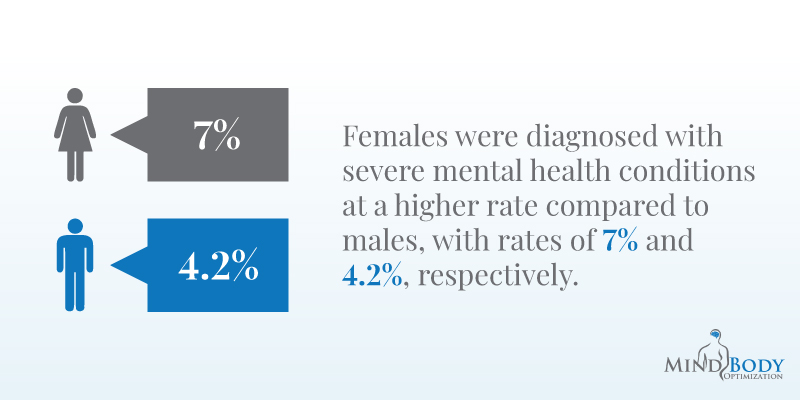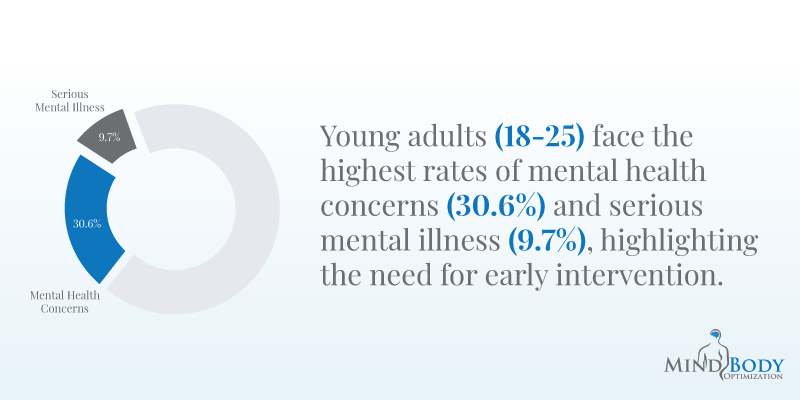These disorders can significantly impact a person’s quality of life, affecting their relationships, work, and well-being.
Here are some key statistics to highlight the prevalence and impact:
Recognizing the prevalence and impact of mental health disorders is essential for fostering greater understanding, empathy, and effective treatment strategies.
A mental health disorder is characterized by a clinically significant disturbance in a person’s cognition, emotions, or behavior. This disturbance can lead to distress, impaired functioning, or both.
It’s crucial to understand that mental health disorders are not personal weaknesses or character flaws. They often have complex biological, psychological, and social contributing factors.
Combating these misconceptions is crucial to creating a more understanding and supportive environment for those living with mental health disorders.
Early detection and intervention are critical for effective treatment and improved outcomes. When identified and addressed early, many mental health disorders can be managed successfully, allowing people to lead fulfilling lives.
Here’s why early intervention matters:
By understanding these key points, we can move toward a more informed and compassionate society that encourages open dialogue and timely support for mental health concerns.
Mental health disorders encompass a broad spectrum of conditions that affect a person’s thoughts, emotions, and behaviors.
These disorders are characterized by disturbances in:
Common types of anxiety disorders include:
Mood disorders are characterized by disturbances in mood. These disturbances range from persistent sadness and hopelessness to periods of elevated mood or mania.
Examples of mood disorders include:
Post-traumatic stress disorder (PTSD), acute stress disorder, and adjustment disorders are among the conditions classified in this category.
Substance use disorders involve problematic patterns of alcohol, drug, or medication use. These patterns lead to significant impairment in physical, psychological, or social functioning.
Substance use disorders may include:
Other related disorders include body dysmorphic disorder (BDD), hoarding disorder, and trichotillomania (hair-pulling disorder).
Personality disorders are characterized by enduring patterns of inner experience and behavior that deviate from cultural expectations and cause distress or impairment.
Other mental health disorders include:
Mental health is closely connected to a person’s well-being. It encompasses physical, emotional, social, and spiritual dimensions of health.
Mental health disorders not only impact cognitive and emotional functioning but also affect:
The interplay between mental health and general well-being is multifaceted, with various factors influencing both mental health outcomes and general well-being.
While the specific symptoms vary across different mental health disorders, there are often common warning signs that shouldn’t be ignored. Recognizing these signs and seeking professional help is crucial for timely diagnosis and effective treatment.
Here are some common signs that might indicate a mental health concern:
It’s important to remember that experiencing some of these symptoms occasionally doesn’t necessarily mean you have a mental health disorder. But, persistent and disruptive symptoms that interfere with daily life and well-being warrant professional evaluation.
Self-diagnosis is often inaccurate and can delay access to appropriate treatment. A qualified mental health professional can:
Remember, seeking help is a sign of strength and self-awareness, not weakness.
Our dedicated team of professionals specializes in treating:
Treatment modalities for mental health disorders encompass a range of interventions aimed at addressing symptoms and improving well-being. At Mind Body Optimization, we are dedicated to providing a holistic and comprehensive approach to mental health care.
You already take what is needed to achieve your goals. We’re here to collaborate with you on your wellness journey and enable you to reach your full potential.
Together, we can pave a path worth following. One where we can all find sustainable change.
Our treatment philosophy is grounded in the understanding that optimal healing requires addressing the interconnectedness of mind, body, and spirit.
We strive to create a supportive and empowering environment where people can explore their unique needs, strengths, and goals, paving the way for sustainable recovery and personal growth.
We offer a diverse selection of evidence-based therapies to provide you with the most suitable tools for your journey. Some of our modalities include:
Our team employs CBT to empower people to identify and challenge negative thought patterns and behaviors contributing to their mental health challenges. By working together to develop practical coping strategies, clients gain control over their thoughts and actions.
This leads to improved mood and increased resilience.
DBT is offered to address emotional dysregulation and interpersonal difficulties. Through mindfulness practices and skills training, clients learn effective coping strategies. This fosters emotional awareness and healthier relationships, leading to stability and fulfillment.
Using EMDR, our therapists guide clients in processing trauma-related symptoms, promoting healing and resolution. By exploring traumatic memories, clients experience a reduction in distressing symptoms and a greater sense of empowerment in navigating their trauma history.
We employ Motivational Interviewing to elicit and strengthen motivation for behavior change. Through empathic listening and reflective questioning, clients uncover intrinsic motivations, addressing barriers to change and enhancing readiness for positive steps towards their desired outcomes.
Mind Body Optimization will soon offer transcranial magnetic stimulation (TMS). TMS is a non-invasive brain stimulation technique for treating depression by modulating neural activity in specific brain regions associated with mood regulation.
This promising modality enhances our comprehensive approach to mental health care, addressing both psychological and physiological aspects of well-being.
We treat more than just symptoms. As part of our expanding services, Mind Body Optimization will offer hormone testing to assess hormonal imbalances that may impact:
In the near future, Mind Body Optimization will introduce nutritional counseling services to support clients in optimizing their physical and mental well-being. Our experienced counselors will provide personalized guidance and education on nutrition.
The goal is to empower clients to make healthier choices and improve their health.
At Mind Body Optimization, we believe in the effectiveness and accessibility of outpatient care, tailoring our services to empower you on your journey towards well-being.
Outpatient mental health treatment provides numerous benefits, making it a suitable choice for various situations due to:
At Mind Body Optimization, we recognize the importance of flexibility and personalized care in supporting clients on their journey towards mental wellness.
Our outpatient treatment programs are designed to accommodate the diverse needs, schedules, and preferences of our clients, allowing them to access care at times that are convenient for them.
We offer a diverse range of outpatient treatment options, including:
Prioritizing your mental health is not just self-care; it’s an investment in your well-being, your relationships, and your ability to thrive. At Mind Body Optimization, we believe everyone deserves access to compassionate, evidence-based care that empowers them to achieve lasting positive change.
Remember, reaching out for help is a courageous and empowering decision that can lead to positive changes and improved well-being. Take the first step toward a healthier, happier future.







